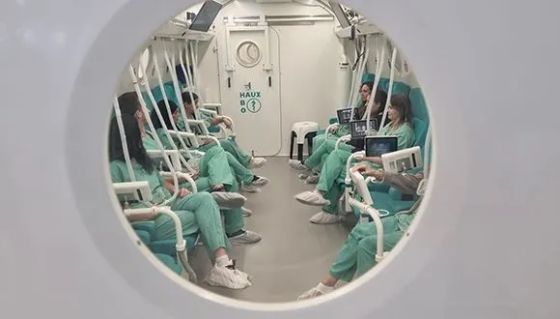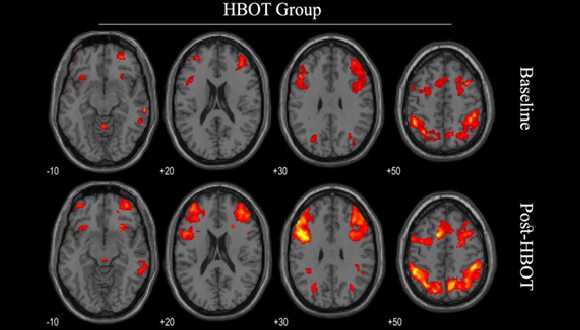
Hyperbaric Oxygen Therapy: A Promising Treatment for PTSD Symptoms
Biological damage in PTSD sufferers can be treated with a specialized protocol.
Researchers at Tel Aviv University and the Sagol Center for Hyperbaric Medicine and Research at the Shamir Medical Center have demonstrated that hyperbaric oxygen therapy (HBOT) improves the condition of PTSD sufferers who have not responded to psychotherapy or psychiatric medications. The researchers: “Our unique therapeutic protocol affects the biological brain ‘wound’ associated with PTSD, and effectively reduces typical symptoms such as flashbacks, hypervigilance, and irritability. We believe that our findings give new hope to millions of PTSD sufferers and their families, all over the world”.
The study was led by Prof. Shai Efrati and Dr. Keren Doenyas-Barak from the Faculty of Medical and Health Sciences at Tel Aviv University and the Sagol Center for Hyperbaric Medicine and Research at the Shamir Medical Center. Other contributors include Dr. Ilan Kutz, Gabriela Levi, Dr. Erez Lang, Dr. Amir Asulin, Dr. Amir Hadanny, and Dr. Ilia Beberashvili from the Shamir Medical Center, and Dr. Kristoffer Aberg and Dr. Avi Mayo from the Weizmann Institute. The paper was published in The Journal of Clinical Psychiatry.
“At present, we treat hundreds of PTSD sufferers every day”
Prof. Efrati: “Due to our unfortunate circumstances, Israel has become a global leader in the field of PTSD. Before the Hamas attack on Oct. 7, 2023, approximately 6,000 IDF veterans had been recognized as PTSD sufferers, with many others, both soldiers and citizens, not yet acknowledged by the authorities. Following Oct. 7 and the ensuing war, these numbers have risen sharply. Tens of thousands of soldiers, and much larger numbers of civilians, are likely to be diagnosed with PTSD. The world-leading Sagol Center for Hyperbaric Medicine, the largest of its kind in the world, is rising to the challenge – with a comprehensive therapeutic array comprising hyperbaric facilities combined with diverse mental health professionals, psychologists and psychiatrists. At present, we treat hundreds of PTSD sufferers every day, aiming to reach one thousand patients per year”.
Dr. Doenyas-Barak: “PTSD (Post-Traumatic Stress Disorder) is defined as the mental outcome of exposure to a life-threatening event. About 20% of those who have undergone such an experience will develop PTSD, which can lead to substantial social, behavioral, and occupational dysfunctions. In extreme cases, the disorder can severely impact their quality of life, family life, and professional performance. Symptoms include a range of emotional and cognitive changes, nightmares and flashbacks, hypervigilance, irritability, and avoidance – so as not to trigger traumatic experiences. In many cases, PTSD is resistant to psychotherapy and common psychiatric medications. Past studies on therapy-resistant sufferers have found changes in the structure and function of brain tissues, or a ‘biological wound’ that explains such treatment resistance. In our study, we wanted to determine whether hyperbaric therapy can help these patients”.
Testing HBOT for PTSD Relief
The study, which began in 2019 and ended in the summer of 2023, included 98 male IDF veterans diagnosed with combat-associated PTSD, who had not responded to either psychotherapy or psychiatric medications. Participants were divided into two groups: one group received HBOT treatment, breathing pure high-pressure oxygen, while the other underwent the same procedure, but received a placebo treatment, breathing regular air. 28 members of each group completed the process and the following evaluation.
Dr. Doenyas-Barak: “The HBOT was administered in accordance with a unique treatment protocol developed at our Center. Every patient is given a series of 60 two-hour treatments in our hyperbaric chamber, during which they are exposed to pure 100% oxygen at a pressure of 2 atmospheres (twice the normal air pressure at sea level). Our protocol specifies alternately breathing oxygen and regular air: every 20 minutes the patient removes the oxygen mask and breathes regular air for five minutes. The drop in oxygen level, at the tissue level, activates healing processes and thus enhances the therapeutic effect”.

Functional MRI before and after HBOT. Photo credit: The Shamir Medical Center.
The results were encouraging, with improvements observed both at the clinical level and in fMRI imaging. The group that received hyperbaric therapy showed improved connectivity in brain networks, alongside a decline in all typical PTSD symptoms. In the placebo group, on the other hand, no change was observed in either the brain or clinical symptoms. Prof. Efrati: “Our study demonstrated that HBOT induces biological healing in the brain of PTSD sufferers. Curing the biological wound also impacts clinical symptoms. We believe that HBOT, based on the special protocol we have developed, can bring relief to numerous PTSD sufferers worldwide, allowing them to resume a normative life in their community and family”.
Prof. Efrati emphasizes:
“Patients suffering from PTSD should undergo HBOT only at professional hyperbaric centers, where treatment is delivered by multidisciplinary teams experienced in trauma care. Unsupervised, private hyperbaric chambers are unable to provide a proven, effective protocol. Additionally, patients must receive a thorough professional evaluation to ensure they are suitable for HBOT and to determine what additional support is needed throughout their treatment journey”.
